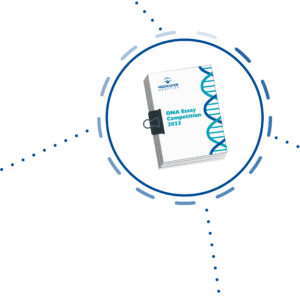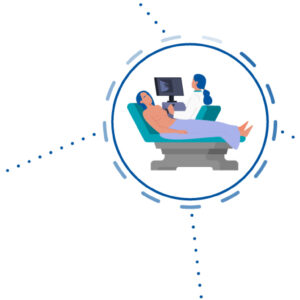SCIENTIFIC BACKGROUND
Breast cancer remains the most common cancer type amongst women. In 2020, 2.3 million women were diagnosed and 685,000 died globally. With increasing treatment options for breast cancer, profiling the genomic landscape of breast tumors and incorporating those findings into patient care has become critical. Breast cancer is recognized as a group of heterogeneous diseases with variable clinical courses and treatment responses. Gene expression profile assays allow for recurrence risk prediction beyond clinical and pathologic presentations and refinement of adjuvant therapy.
The recent successes of PI3K inhibitor for the treatment of PIK3CA-mutated hormone receptor (HR)–positive breast cancer and of PARP inhibitors in deleterious germline BRCA1/2-mutated tumors, have solidified the role of genomic testing to guide therapy for patients with breast cancer.
GENOMIC ALTERATION
In metastatic HR-positive breast cancer, overexpression of HR and activation of its downstream pathway are key features and anti-estrogen therapy as monotherapy, or in combination, remains the standard of care in the first-line setting. Metastatic HR-positive breast cancers are enriched in the mutation of the ESR1 gene in approximately 20% of tumors as compared to early-stage diseases with less than 5%.
PIK3CA mutation results in the activation of the PI3K/AKT pathway, leading to dysregulation of key cellular functions. PIK3CA mutation is found in different frequencies among breast cancer subtypes, with HR-positive breast cancer having the highest frequency of 40% of tumors in both systemic and early-stage diseases. Other mutations along the PI3K/AKT pathway are also present in HR-positive breast cancer, including AKT1 and PTEN. Like PIK3CA, these mutations are found most commonly in HR-positive breast cancer. Other common genomic alterations in HR-positive breast cancer, including CDH1, GATA3, KMT2C, MAP3K1, MAP2K4, NF1, and ERBB2, have been implicated as potential driver mutations, mechanisms of resistance, or prognostic markers.
In metastatic HER2-positive breast cancer, HER2 is encoded by ERBB2, and ERBB2 amplification is a common feature of HER2-positive breast cancer. The significance of ERBB2 amplification predicts a benefit from HER2-directed therapies. Activating ERBB2 mutations can result in altered cell growth and differentiation in addition to the activation of the mitogen-activated protein kinase pathway. Given that up to one-half of HER2-positive breast cancer also expresses HRs at various levels, genomic alterations may be shared between these two patient populations.
TP53 mutations are observed in HER2-positive breast cancer in approximately 55% of both early-stage and metastatic disease. Brain metastasis remains a clinical challenge in HER2-positive breast cancers.
In metastatic triple-negative breast cancer (TNBC), which is characterized by a lack of estrogen receptor, progesterone receptor, and HER2 expression, has a worse prognosis than other breast cancer subtypes. Despite the recent approval of immune checkpoint blockade in metastatic TNBC, resistance inevitably develops, and survival outcomes remain poor. Genomic profiling of TNBC has revealed that several genetic alterations are present at higher prevalence than in other breast cancer subtypes. TP53 tumor suppressor gene mutations are found in more than one-half of metastatic TNBC tumors and reach up to more than 90% in certain reports. TP53 mutations are frequent in early-stage TNBC as well, nearing 70% to 80%. Targeted therapy that restores TP53 function remains an important unmet need in oncology. Other than TP53, other mutations include PIK3CA, RB1, and PTEN but at a much lower frequency.
Germline mutations of BRCA1/2, which are known to cause homologous recombination deficiency (HRD), are found in 10% to 20% of TNBC, and somatic mutations of BRCA1/2 are found in 3% to 5% of TNBC. Multiple somatic mutations that can result in HRD have been implicated, including BRCA1/2, RAD51, PALB2, ATR, CHK1, WEE1, and PLK1, among others. These mutations are observed in all metastatic breast cancer subtypes but in relatively low frequencies.
In addition to specific genomic alterations, evaluation of tumor microsatellite instability (MSI) that leads to defects in DNA mismatch repair has become a standard of care in metastatic solid tumors. Patients with tumors that harbor MSI are candidates for treatment with the immune checkpoint inhibitor pembrolizumab. MSI has been documented in breast cancer but at a lower frequency compared with other tumors.
POSSIBLE THERAPIES
Approvals for alpelisib and PARP inhibitors for the treatment of metastatic breast cancer with PIK3CA mutations and germline BRCA1/2 mutations, respectively, have highlighted the importance of incorporating breast cancer genomic profiles into treatment consideration. Tumor-agnostic treatment indications for microsatellite instability and NTRK fusions provide additional treatment options for patients whose disease harbors those genetic alterations. Recognizing that current frontline treatments for breast cancer are based on well-founded evidence, tumor genomic testing should be performed in the appropriate setting to help guide therapy.
GENE PANEL
21 genes: AKT1, ATM, BRCA1, BRCA2, CCND1, CHEK2, ERBB2, FAT1, FGFR1, MDM2, MYC, NF1, NTRK1, NTRK2, NTRK3, PALB2, PIK3CA, PTEN, RAD51C, RB1, STK11
TARGETED PANEL
BRCA1, BRCA2, PIK3CA, NTRK1/2/3 fusion, MSI





















